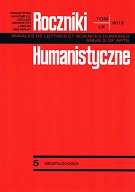Predicational, Specificational, Equative and Identificational Copular Clauses in English and Polish
Predicational, Specificational, Equative and Identificational Copular Clauses in English and Polish
Author(s): Anna BondarukSubject(s): Language and Literature Studies
Published by: Towarzystwo Naukowe KUL & Katolicki Uniwersytet Lubelski Jana Pawła II
Keywords: copular clauses; predicational; specificational; equative; identificational clauses; Polish; English
Summary/Abstract: The paper confronts the typology of copular sentences proposed by Higgins (1979) for English with the Polish data. Higgins distinguishes in English four types of copular sentences, such as predicational, specificational, equative and identificational. The paper shows that these four types of sentences are also present in Polish although their inventory is much bigger than in English because, in addition to the verbal copula, Polish also has a pronominal copula to, and even shows the co-occurrence of these two elements in the same clause (the so-called dual copula sentences). All these three types of copula sentences may have a predicational function, but the remaining three functions can only be associated with the clauses containing to or those with both to and być. The paper presents examples of ambiguous sentences and the tests to eliminate the ambiguity. An attempt has also been made to reduce Higgins’ typology. It has been shown that Polish inverted equative sentences show properties typical of specificational sentences. As for identity statements, arguments have been provided in favour of the claim that both in English and in Polish they can be classified as either specificational or equative.
Journal: Roczniki Humanistyczne
- Issue Year: 60/2012
- Issue No: 05
- Page Range: 7-26
- Page Count: 20
- Language: English

